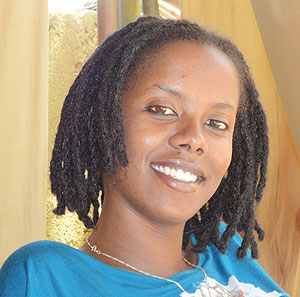Isabelle Kamariza, is the President of Solid Africa—a Non Government Organisation (NGO) that helps vulnerable patients in public health facilities. She is the young Rwandan woman who discovered Esperance Nyiramajyambere with her burnt baby, Niyigema Ndagije at the Central Hospital of Kigali (CHK).


Isabelle Kamariza, is the President of Solid Africa—a Non Government Organisation (NGO) that helps vulnerable patients in public health facilities. She is the young Rwandan woman who discovered Esperance Nyiramajyambere with her burnt baby, Niyigema Ndagije at the Central Hospital of Kigali (CHK).
A devout Christian, she was convicted by a minister’s sermon at her church. She was forced out of her, "comfortable seat to go out and do something—anything at all,” she said.
"I went to church and the minister said, ‘How come you pray for the sick people and you don’t care about going to visit them in the hospital.’ And this is where I started from,” Kamariza narrated.
When she visited CHK, she was shocked at the sight of stranded patients.
"There were sick people outside, mostly children and women; some of them had spent two weeks outside without treatment and it was raining. I asked myself, how can we people go back and sleep in our comfortable beds on a soft mattress and just chill out, wake up and spend Rwf1000 for a coke when there are all these sick people sleeping in the cold, right in our neighbourhoods?” she said.
This 25-year-old young woman started raising bits of money, milk and food from her friends, parents and relatives to take to the CHK hospital.
"I began begging people to help. I would go to mama and say ‘please give me 5000 francs and I will do this… please give me milk and I will do this…’and I begun like that,” Kamazira said.
Kamariza contacted the former president of the Rotaract Club Rwanda, Ariane Inkesha (they were classmates at Ecole Belge). She shared her concerns and plans of visiting patients at the hospital and Inkesha agreed to go with her. Through the initiative of Kamariza and Inkesha, in March, 2010, the Rotaract Club of Rwanda, contributed Rwf160,000 and released several patients from CHK hospital. They also organised a fundraising ball to release patients at Muhima hospital.
Another Rotaract Club member raised USD300 money at her workplace that was used to buy medication for baby Ndagije. Sooner than later, a network of people who wanted to help the baby was raised.
Kamariza said: "Without the Rotaract Club, I wouldn’t have done all this.
"I will be working with the Rotaract Club until June-July 2011 and my hope is that through our NGO we shall help the most vulnerable patients in public hospital who are perpetually ignored because they are too poor to pay their bills.
"It’s in public hospitals that patients are still kept like prisoners when they fail to pay their bills.
Through Solid Africa, this young woman activist says, she intends to clear some of the patient’s bills, release them, and also pay for their bus tickets to go back to their respective homes.
She said: "Some patients are brought with ambulances, and when given their transport fare, they don’t even know where the buses are, because they’ve never been to Kigali… they are so lost…so sometimes I have to drop them at the bus station, buy their tickets and put them on the buses that will take them back to their homes.
"I think many people don’t really know that there are patients stranded in public hospitals; I also didn’t really know until I went to CHK.
"Just seeing people leaving the hospitals is what makes me work harder. It could be me or anyone in that situation. People need to know that they do not have to give a million to make a difference in people’s lives…anything small can make a huge difference.”
Kamariza, already has previous working experience with the homeless. While studying law in a Belgium university, she worked with an organization that provided food and drink to homeless people in Belgium’s subways and streets.
"It’s not just the Christian thing to do; it’s about loving, caring and helping people. This is what I want to do; that’s why I will go back to study a one-year course on the ‘Infrastructure of humanitarian projects’ in January or March 2011,” Kamariza said.


